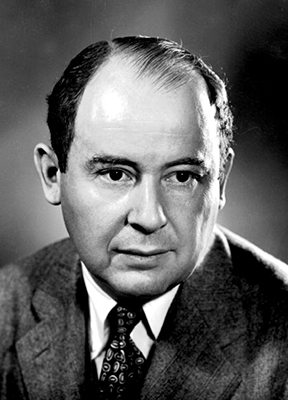János Neumann

(Budapest, December 28, 1903 – Washington D.C., February 8, 1957)
One of the most outstanding mathematicians of our century, a university professor.
He graduated from the Fasori Lutheran High School in Budapest. He completed his university studies in parallel in Zurich where he graduated in chemical engineering and at the Budapest University of Technology. He obtained his doctorate in mathematics in Budapest. In 1930 he was a guest lecturer at Princeton University (USA) and a professor from 1931. In 1933 he accepted a permanent teaching position at the Institute for Advanced Study (Princeton). In 1954, he was appointed a member of the U.S. Atomic Energy Commission and served in that capacity until his death. At the beginning of his career his work mainly covered mathematical logic and set theory; the exact foundation of set theory originates from his work. His outstanding results in the field of quantum theory are the mathematical basis of the theory of the measurement of physical quantities. The foundations of Game theory are also primarily due to his work, as well as so-called operations research, which significance has since been widely recognized in its economics. He played an important role in the development of electronic computers. The basic ideas of this (application of the binary number system, memory, program storage, instruction system, etc.) come from him. His role in solving the theoretical problems related to the release of nuclear energy has internationally been recognized.



